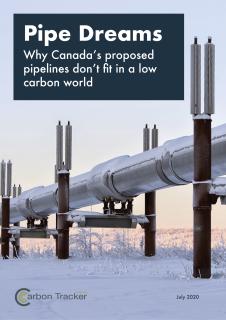
This resource discusses the future of Canada's oil sand pipeline projects. Prospective pipeline projects represent a significant expansion of capacity, with taxpayer support. However, new pipelines are surplus to requirements under Paris Agreement demand levels.
The report reveals:
- All proposed new pipelines from Western Canada, in particular Keystone XL and Trans Mountain expansion, are surplus to requirements in a Paris-compliant world;
- Even if discounts for Canadian crude narrow, new oil sands projects remain uneconomic;
- Investors in oil sands face depressed cash flows in a low carbon world of falling oil demand and weak pricing, but will be forced to produce or pay the price due to inflexible “take-or-pay” transport fees for excess new pipeline capacity;
- While take-or-pay contracts spread the impacts, pipeline investors still face financial risks as upstream production weakens;
- The Canadian government’s stakes in Keystone XL and Trans Mountain could well prove to be a drain on the public purse.
Canadian authorities face the challenge of trying to reconcile their natural resources development plans with their positioning on climate. Canada has previously having shown leadership on climate change issues, but its government support for pipelines – which are reliant on the failure of the Paris Agreement – risks damaging its credibility.
